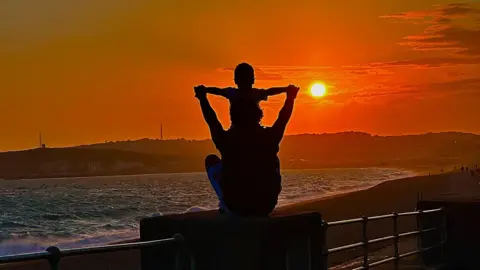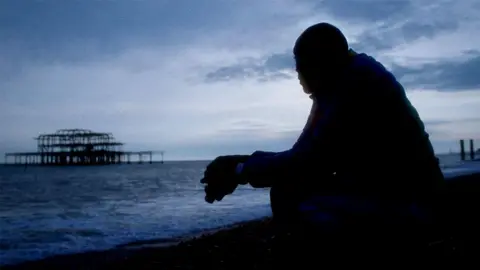Refugees face family separation 'torture'
 Osamah
OsamahRefugees who escaped violence and persecution have described their heartbreak at having to wait years for their loved ones to join them in the UK.
Paul, who fled Uganda after police jailed and tortured him, said multiple delays, difficult paperwork, and legal costs meant he had to wait more than a decade to reunite with his daughter in Brighton, East Sussex.
"Not having my family with me was mental torture," he told the BBC. "I was going crazy."
A Home Office spokesperson said the UK had a "long history of providing protection for those in need".
"All applications are assessed on their individual merits and in line with immigration rules," they added.
'I started losing hope'
Paul, whose name has been changed to protect his identity, said he had to escape Uganda without his family in 2009.
He was granted UK refugee status in 2013 and applied for family reunion that same year.
Paul asked the BBC not to disclose why he was persecuted because of his safety and privacy concerns.
He said he missed his daughter "so much" while they were separated, as they could only communicate through calls or texts.
 Paul
Paul"I wanted my life to end because I started losing hope," he said. "But a friend told me never give up."
His now 16-year-old daughter, who spent time sleeping on the streets in Uganda during their separation, was permitted to join him in October 2024.
"I can't believe she is here with me," Paul added. "I can't stop smiling."
'I was really lucky'
Osamah, from Yemen, where there has been a civil war since 2014, told the BBC he had to seek protection in the UK as his life was in danger, though he did not want to elaborate further due to his safety concerns.
He said he "immediately" applied for family reunion after he was granted refugee status in 2021.
Osamah, who now lives in Brighton, said he fled the Middle East when his son was three months old.
"I needed to see him," he said. "For people in normal situations, one hour is one hour. But for me and other people who are far away from their families every single minute is like a year."
"It is precious time," Osamah added.
 Osamah
OsamahHis wife and son, who were living near the conflict zone in Yemen at the time, were able to join him in the UK nearly a year after he applied, and they have since had a baby girl.
"The wait was really too much for me," he said.
Osamah added it was "very expensive" to pay for a solicitor to aid his family reunion application, which he could only afford with support from friends and local NGOs.
"I was really lucky," he said. "But what about others who do not understand [the process] or know any organisations that can help?"
"What do they do?"
How does refugee family reunification work?
Once someone is granted refugee status - which means they have proven they have a well-founded fear of persecution - they can apply for their immediate family members to join them, provided they were part of a family unit before the person fled.
Immediate family members include a partner and children under 18, though the Home Office says it can apply to over 18s in "exceptional circumstances".
The Home Office says the policy "recognises that families can become fragmented because of the nature of conflict and persecution, and the speed and manner in which those seeking asylum are often forced to flee".
It adds that applications are considered in a "timely and sensitive manner on an individual, objective and impartial basis", and that abuse of the policy is prevented by "carefully reviewing" applications.
The Home Office asks applicants to provide a written statement with information about their family, supporting document evidence, and a legal representative.
Applications can be refused based on fraudulent documents or evidence of deception.
Follow BBC Sussex on Facebook, on X and on Instagram. Send your story ideas to [email protected] or WhatsApp us on 08081 002250.
